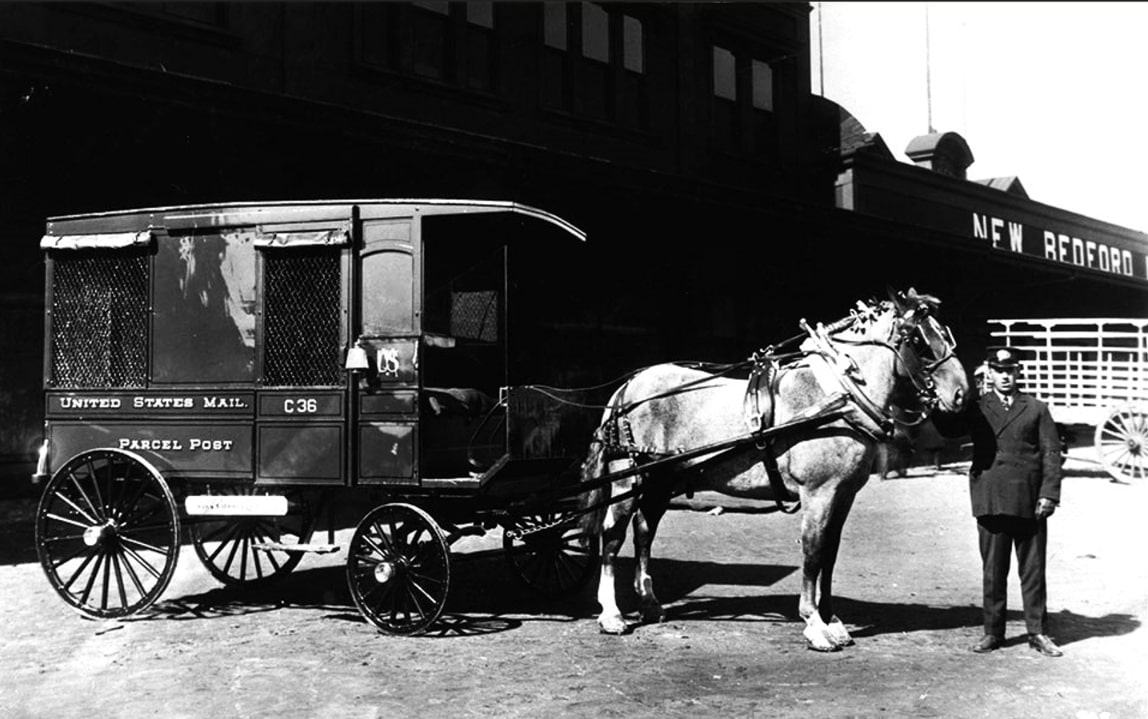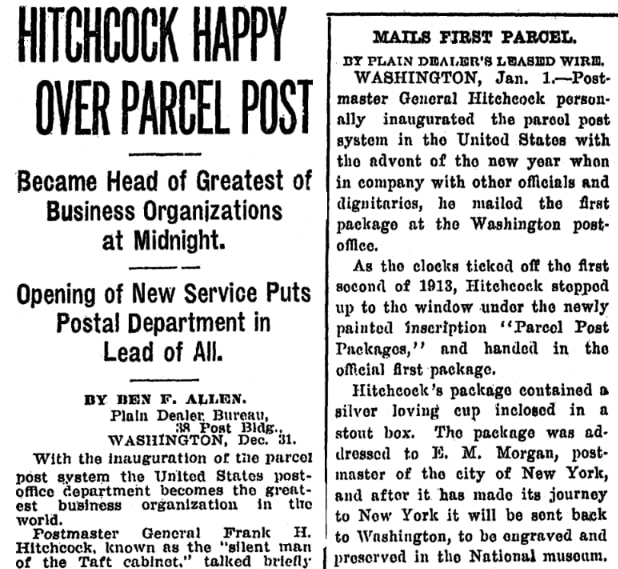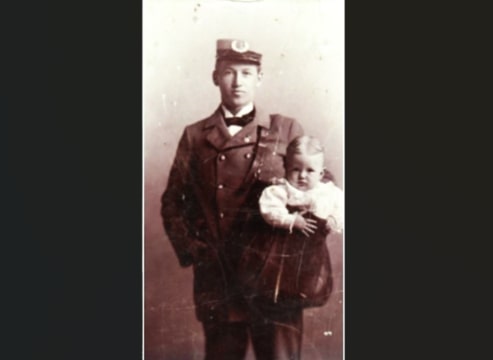Introduction: In this article, Melissa Davenport Berry tells an astonishing tale of a New Year’s event in 1913: people started mailing babies! Melissa is a genealogist who has a website, americana-archives.com, and a Facebook group, New England Family Genealogy and History.
With the New Year here tomorrow, it is fun to look back at New Year’s memorable events from years gone by. Today’s story will both entertain and surprise readers.
On 1 January 1913 the United States Postal Service (USPS) began its Parcel Post service, and it proved to be very successful.
Below is a photograph typical of the wagons used for mail and parcel post delivery in the early 20th century, this one from New Bedford, Massachusetts.

With this service came a trend that you would never imagine possible today: the mailing of tots. It seems the stork lost his job in 1913, and the postman took on the position of delivering the babies! Hard to believe – but true.
New Parcel Post Service – First Package Mailed

This article reports:
Postmaster General Hitchcock personally inaugurated the parcel post system in the United States with the advent of the new year when in company with other officials and dignitaries, he mailed the first package at the Washington post office.
As the clocks ticked off the first second of 1913, Hitchcock stepped up to the window under the newly painted inscription “Parcel Post Packages,” and handed in the official first package.
Hitchcock’s package contained a silver loving cup enclosed in a stout box. The package was addressed to E. M. Morgan, postmaster of the city of New York, and after it has made its journey to New York it will be sent back to Washington, to be engraved and preserved in the National Museum.
Mailing Tots First Class
While this may seem outrageous today, mailing babies via the post carrier was a safe and affordable method, according to sources.
The Daily Oklahoman published a letter from a man in Georgia to Postmaster Hitchcock asking for instructions on how to send a baby through the U.S. mail using the new parcel post service.
The letter asks:
“I have been corresponding with a party in Pa. about getting a baby to raise (our home being without one). May I ask you what specifications to use in wrapping so it (baby) would comply with regulations and be allowed shipment by parcel post, as the express co. are too rough in handling.”
Newsclips from the Archives
This article explains that there were length and weight limits for mailing live babies.
This article reports:
Vernon O. Lytle, mail carrier on rural route No. 5 out of this place [Batavia, Ohio], is the first man to accept and deliver under parcel post conditions a live baby. The baby, a boy [Jesse A. Beagle] weighing ten and three-quarter pounds, just within the eleven-pound weight limit, is the child of Mr. and Mrs. Jesse Beagle of near Glen Este.
The “package” was well wrapped and ready for “mailing” when the carrier got it. Its measurements reached seventy-one inches, also just within the law, which makes seventy-two inches the limit. Mr. Lytle delivered the “parcel” safely to the address on the card attached, that of its grandmother, Mrs. Louis Beagle, who lives about a mile from its home. The postage was 15 cents, and the “parcel” was insured for $50.
File this next story under the category “Truth is stranger than fiction.” It’s an astonishing tale of two babies, who were being delivered in the mail, saved by a wooden leg wielded as a club.
This article reports:
Two babies and a wooden leg were among the “parcels” with which Edgar F. Phillips, a rural carrier of the local post office [Ulmers, South Carolina], set out on his route today.
Although sent by parcel post, the babies were first class mail, Phillips says, and good and quiet.
So all went well until the carrier was passing through a clump of woods.
There, with a savage screech, a wildcat attacked Phillips and his human parcels.
The babies added their frightened cries.
For lack of a better weapon Phillips wielded the wooden leg so lustily that the wildcat soon made use of his own and fled, limping into the wilds. The leg was slightly scratched by the wildcat’s claws and the babies were a little hoarse, but the women to whom they were addressed accepted them without complaint.
Next is a story about a two-year-old being mailed from Oklahoma to Kansas.
This article reports:
Mrs. E. H. Staley, of this city [Wellington, Kansas], received her two-year-old nephew by parcel post today from his grandmother in Stratford, Okla., where he had been left for a visit three weeks ago. The boy wore a tag about his neck showing it had cost 18 cents to send him through the mails.
Stay tuned for more New Year’s Memorable Events!
Explore over 330 years of newspapers and historical records in GenealogyBank. Discover your family story! Start a 7-Day Free Trial
Note on the header image: postal carrier with baby in mail bag. Credit: Smithsonian National Postal Museum.
